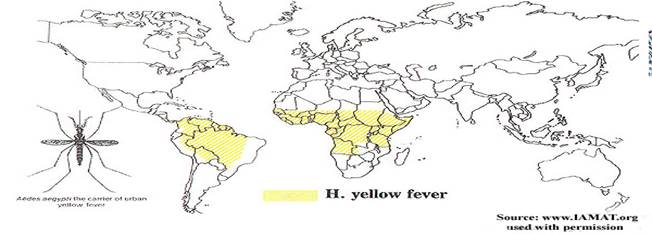Yellow Fever
WHAT IS YELLOW FEVER?
Yellow fever is a viral disease transmitted between humans by a mosquito. It causes a serious haemorrhagic fever with a fatality rate of greater than 60% in non-immune adults. Yellow fever is characterised by fever, jaundice and bleeding. Other symptoms include nausea, vomiting, stomach discomfort, muscle pains, restlessness and irritability.
Where Am I Most At Risk?

Yellow fever occurs in many rural areas in South America and Africa. There is a significant risk of contracting the infection for travellers visiting many of the countries on these two continents. Your travel medicine provider will be able to tell you which particular areas are infected.
How Do I Avoid Yellow Fever?
1. PERSONAL PROTECTION

Every traveller's first line of defence is to use personal protective measures against mosquitoes. Wear mosquito repellent containing DEET and stay in air-conditioned or well-screened rooms. Reduce skin exposure when outdoors by wearing socks, long pants and long-sleeved shirts. Use low dose repellents on children. If travelling in rural areas, carry along a portable bed net, preferably impregnated with permethrin, and spray the room with aerosol insecticides to kill mosquitoes.
2. VACCINATION

Yellow fever vaccine is a required vaccine for entry into, and on return from, certain countries of Africa and South America. The yellow fever vaccine is a live vaccine prepared in eggs. A single dose confers long immunity now thought to last a lifetime.
Who Should Not Receive The Vaccine?
The vaccine is contraindicated for:
- Infants under 4 months of age, but most are deferred till 9 -12 months of age
- Pregnant women unless at extremely high risk
- Persons who are hypersensitive to eggs
- Immunosuppressed persons

Travellers who have a medical reason not to receive the yellow fever vaccine should obtain a medical waiver. This needs to be provided by a registered yellow fever clinic.
Are There Any Side Effects To The Vaccine?

Reactions to the vaccine are usually mild and include fever, headache and muscle aches. These reactions usually occur 5 -10 days after immunisation. Serious side effects are rare. The vaccine must be given in accordance to WHO guidelines and we require you stay for 15 minutes in the clinic after you have received the immunisation, as immediate reactions are possible, although infrequent.
Yellow Fever Legal Requirements

After immunisation an International Certificate of Vaccination is issued to meet entry requirements for people travelling to or arriving from countries where there is potential yellow fever transmission. These requirements vary from country to country, and may depend on where you have been or where you are going, and can be quite confusing. For example, if you are entering Rwanda, a yellow fever vaccination is compulsory for all travellers. If you are going to Kenya, yellow fever vaccination is not required for entry into Kenya if you are coming directly from an uninfected country such as Australia. Health authorities will still recommend that you have the vaccine if you don't want to catch yellow fever when you are in Kenya.
However, if you have been to an infected African country (e.g. Uganda) before going to Kenya, having a valid vaccination certificate is mandatory, otherwise customs will not let you into Kenya.
Similarly, if you are returning to Australia from Kenya, a valid yellow fever immunisation certificate is required to enter Australia, as our customs officials do not want you to bring in and start a yellow fever epidemic here in Australia. If you are going to the United Kingdom after travelling to Kenya, the certificate is not required to enter the UK, as the UK is too cold for the mosquitoes there to cause an outbreak of yellow fever.
The immunisation is recommended for travel to countries where yellow fever risk exists, even if these countries do not require evidence of immunisation on entry.
There are different types of yellow fever entry requirements. While many countries have no requirements, others may require an International Certificate of Vaccination from travellers arriving from 1 or more of the following:
- Countries or areas that lie in the so-called endemic zone
- Infected countries
- Infected areas
- Countries that are maintained on a list and regarded as infected
In some developing countries, the local health and customs officials administer the vaccine to all travelers who arrive without proof of immunization. The needles and syringes used may not be sterile. If there is a possibility of your itinerary including countries that may require yellow fever vaccination, it is safer to have the vaccine before you leave Australia. In Australia, immunization is available only in centres designated by State Health Departments.

Updated August 2021.


